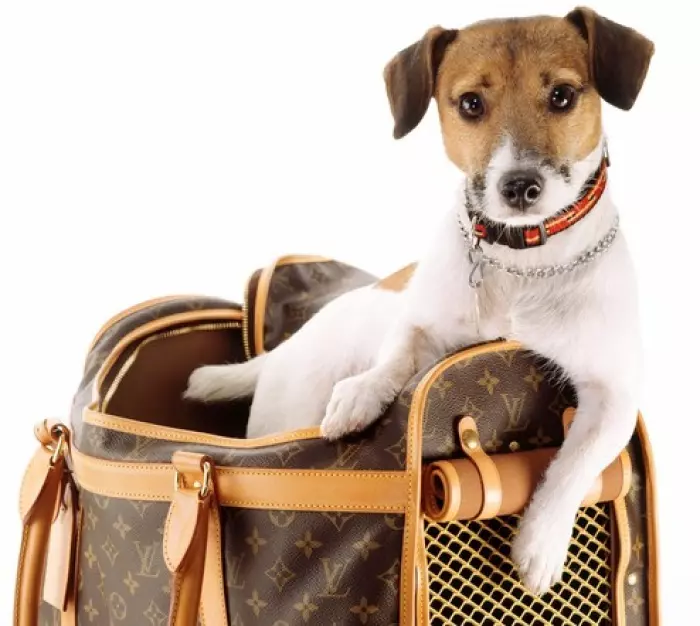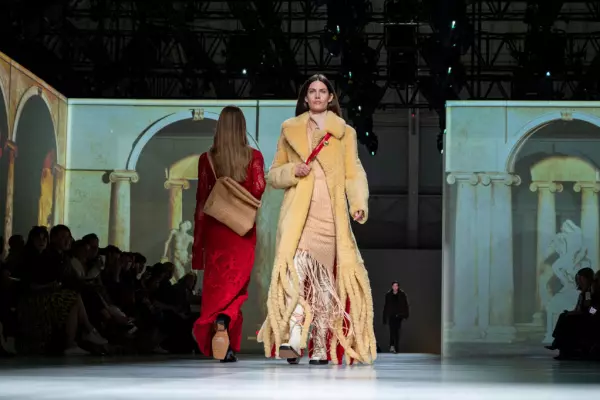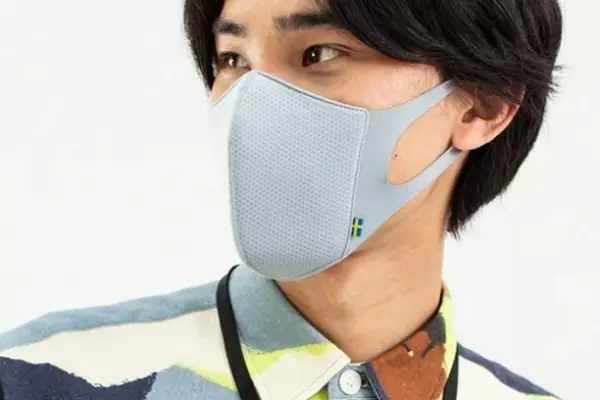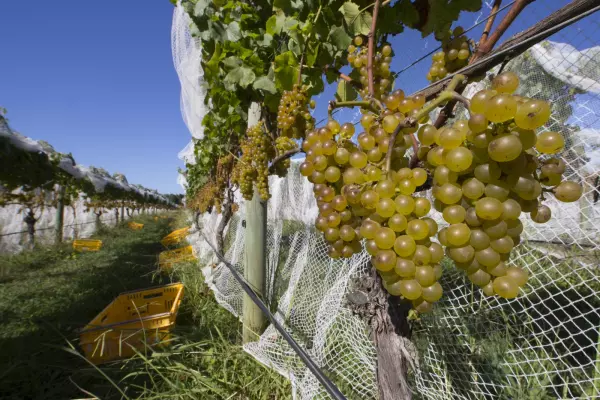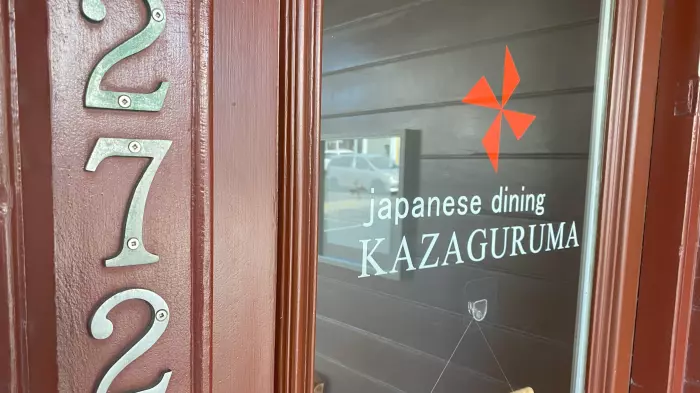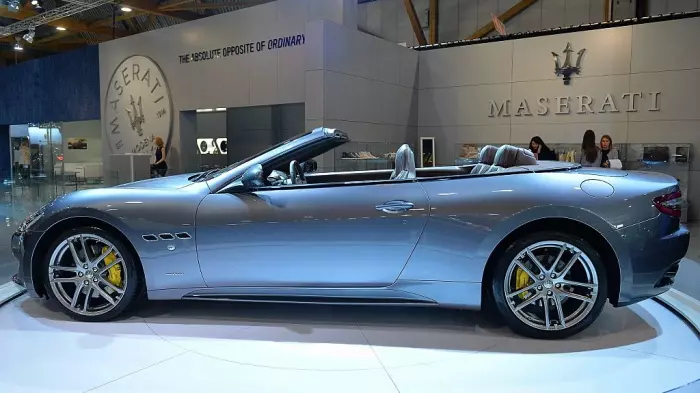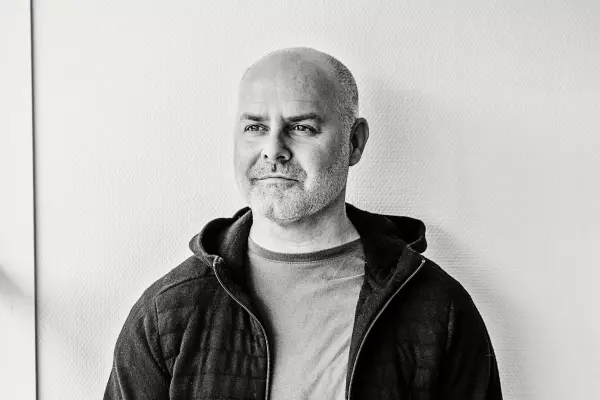Barkley Manor in Auckland is a five-star resort for dogs, with rooms devoted to brain play, grooming and nap time. More-outdoorsy dogs can enjoy forest adventures, running through 60 hectares of trees north of Auckland with their pals.
The elite doggy enterprise is so popular it’s just got its own 10-part documentary series on TVNZ. Narrated by English actor Martin Clunes, it takes viewers inside a dog retreat that seems more like a posh private school. Pups even get divided into houses and receive end-of-year school reports with marks for personality and learning.
It’s heart-warming stuff, and viewers are eating it up like an Alsatian puppy gobbling dinner.
But then, New Zealand is a nation of besotted pet lovers.
Nearly two-thirds of households have at least one pet, and our cat ownership rate is higher than in Australia and the US and double that of the United Kingdom, according to the largest survey of pet owners in New Zealand.
The 2020 survey, conducted by Companion Animals New Zealand, also shows how our attitudes have changed. Today, some 78% of Kiwis describe their dog as “part of the family” and 74% describe their cat the same way – a figure that rises to 77% when the feline’s owner is female.
“We see our companion animals as members of the family,” says veterinarian Fiona Esam, the organisation’s welfare and operations officer. “Guardians want to make sure their family members – human and animal alike – have what they need to be happy.”
So perhaps it’s natural that we want to indulge our good boys and best girls. And if we can show off our personal style at the same time, even better.
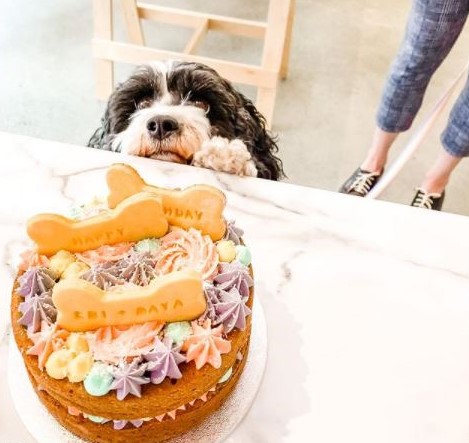 A Smack Bang doggy birthday cake. Photo: Smack Bang.
A Smack Bang doggy birthday cake. Photo: Smack Bang.
Amelia Lingonis describes herself as “design-obsessed”. She and her husband, Chris, launched the Smack Bang shop and website in 2017 because they couldn’t find stylish New Zealand-made accessories for their two dogs.
“We were sick of seeing tacky pet accessories covered in paw-print patterns,” she says. “Our customers appreciate good design and quality products that last.”
Their Instagrammable pink and gold store in Wellington sells everything from sunglasses for cats to Scoop Dog bacon-flavoured ice cream, made from New Zealand goat’s milk. There’s also a bakery that makes dog-friendly cakes and snacks.
“People want to spoil their animals,” says Lingonis. “What used to be seen as silly is normal now, and we love it. We’re constantly surprised by the orders for dog birthday cakes. They’re being ordered by young professionals, families, businesses, retirees … there’s no set demographic.”
Pet-a-Porter: stylish accessories for the modern pup
Dog leashes are also having a fashion moment. “People want matching collars and leads to make their Instagrams pop,” says Lingonis.
Cool urban dudes like the chunky black fittings used by Wolves of Wellington. One bestseller is the Clueless adjustable lead ($43). In yellow and black plaid, it’s inspired by Cher’s iconic chequered suit in the cult 1995 movie Clueless.
Minimalists prefer the leather leads and collars designed by Christchurch brand Ollie & James. In fashion colours such as sable, ink, camel and millennial blush, the $89 leads feature sleek brass detailing.
If that’s too low key, at Auckland’s Sunday Paws website you can bring the fire to your OOTD (outfit of the day) with matching handbag straps and dog leashes (from $68.90), or multitask with the High5Dogs Shoulder Clic leash ($129.90). This has a loop you can sling over your shoulder so your hands are free to carry your double-mocha iced Frappuccino.
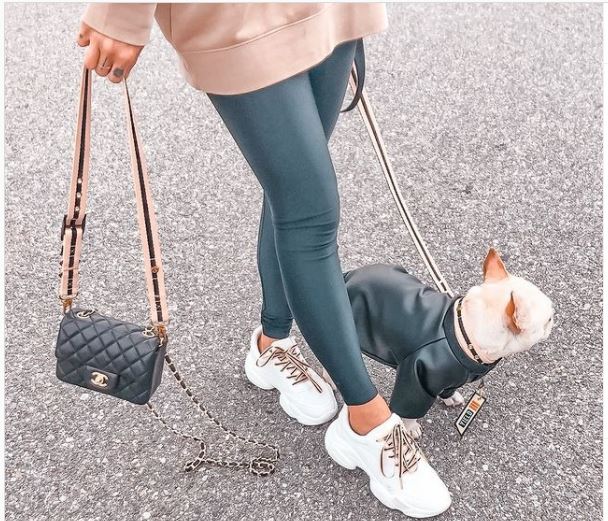 A matching handbag strap and dog lead, anyone? Photo: Sunday Paws.
A matching handbag strap and dog lead, anyone? Photo: Sunday Paws. Luxury fashion maisons are also offering more choices. In the past, they may have offered a collar or two, but now they treat pet accessories as an integrated fashion category, showing everything from monogrammed pet carriers to matching pet-and-pawrent outfits.
Limited-edition fashion drops for dogs include Prada’s Re-Nylon dog backpacks and pet accessories. Prices range from US$20 for a leather dog tag to around US$3000 for a pet bag. In autumn 2020, Moncler offered their first ever collection for pets, the Moncler x Poldo Dog Couture Collection. The puffy dog jackets are selling well, at around US$525 each.
New at Valentino is the Rockstud pet bag, which can be customised with your initial and a hand-painted image of your pet. Louis Vuitton have also expanded their popular monogrammed Baxter range with the Baxter XS collar for petite dogs. It comes with the covetable LV logo and a removable pink bow and brass details, for US$440.
Why we “revenge-spend” on our pets
While pet fashion is fun, the real money is in pet food and treats.
Alice McKinley runs KIN marketing agency in Gisborne, which specialises in social media and events marketing. She has several pet-related clients, including Hale pet supplements and Vetty online worm and flea treatments.
“There’s increasing interest in healthy lifestyle products – both for humans and for pets,” says McKinley. “Customers are looking for more premium, real-food products with ingredients they can pronounce as opposed to processed treats with no real health benefits.
“The trend towards humanising pets has been happening for a while. But the pandemic accelerated it. If you can’t travel or eat out, you’ll spend on nice things to do at home with your family – and that includes your animals.”
McKinley feels “revenge spending” also plays a part. This is when you can’t afford big-ticket items so indulge in small luxuries.
“Many people in their 20s and 30s now don’t feel financially secure enough to buy a house. But people still want companionship. So they think, ‘I can’t necessarily get a mortgage, or have a baby right now, but I can get a dog. And I can get him some special treats as well.’”
One of KIN’s clients is Omega Plus, which processes by-products from the king salmon farming industry into pet snacks and salmon oil health supplements.
Already selling in New Zealand, China and South Korea, Omega Plus just took their first steps into the US$42 billion pet food and pet-treats market in the United States. They took part in SuperZoo, the largest trade show in North America. Held in Las Vegas in August, it attracted more than 20,000 pet professionals from Canada and the US all looking for the latest thing.
McKinley is already seeing more buzz on social media. “People often ask us where the salmon comes from? They’re happy it’s from New Zealand because they know the quality is good. Coming from New Zealand is definitely a good selling point.”
China’s big appetite for NZ pet food
Demand for New Zealand pet food is growing especially fast in China. There, dog and cat ownership has rocketed 300% since 2013, and 100 million pet cats and dogs are now registered. By 2023, it’s estimated the Chinese pet-food market will be worth US$66.8 billion.
The most indulgent pet parents of all in China are urban youth aged 18 to 25. Often raised as an only child, they’re turning to their pets for companionship. They’re spending on everything from better food to doggy massage treatments – then sharing every precious moment and aspirational purchase on social media.
Social sharing platforms such as Little Red Book are alive with videos of cats in Fendi pet carriers and toy dogs nibbling out of pet bowls by Tiffany’s.
Pet power is so strong that luxury brands are falling over themselves to find new ways to feature pets in their marketing programmes. One top cat is a fluffy black Persian called Wladimir, who made his first appearance in Boucheron’s high jewellery collection in 2019. He’s now so popular that Boucheron offers black diamond cat rings crafted in his image.
This booming interest in pets has not escaped the notice of investors. In September, China-based private equity firm FountainVest Partners announced it will acquire New Zealand pet-food company Ziwi, which makes ZiwiPeak air-dried and wet cat and dog food, chews and treats. While the terms of the agreement weren’t disclosed, it’s thought the deal will value Ziwi at about $1.5 billion.
Founded in 2002 by free-range deer farmer Peter Mitchell, Ziwi distributes its products globally. The company is now investing in a state-of-the-art manufacturing facility in Awatoto, near Napier. The 130,000-sq-ft development will cost around $70 million and be equipped with the latest air-drying technology, with a view to doubling capacity.
New Zealand-based Addiction Pet Foods are also expanding. “We are seeing double-digit growth every year,” says Diana Khalid, a senior marketing manager.
The company’s Te Puke plant is already the largest dry-pet-food factory in New Zealand – and it’s still not big enough to meet demand from customers in 14 territories around the world.


